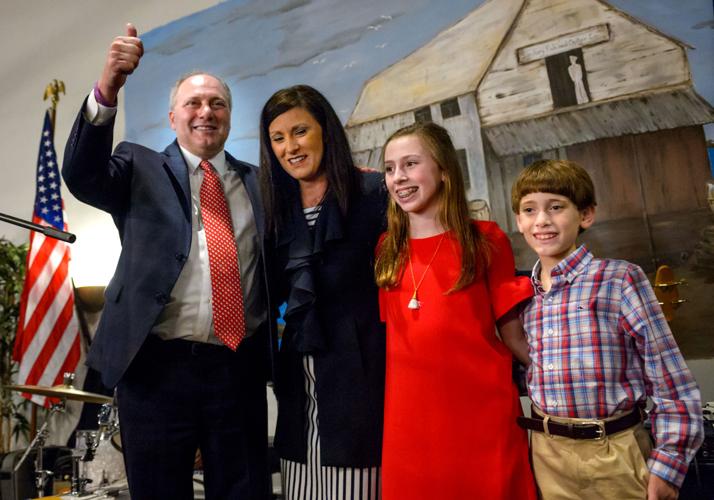WASHINGTON — After crisscrossing the country for months trying to prop up fellow Republicans leading to last week’s midterm elections, U.S. Rep. Steve Scalise was off on a whirlwind tour promoting his new book about his survival and recovery from a shooting.
The Jefferson Parish lawmaker was in New York for a flurry of television interviews about “Back in the Game: One Gunman, Countless Heroes and the Fight For My Life" before heading back to Capitol Hill for the first time since a wave of Democratic victories flipped control of the U.S. House of Representatives.
Scalise, 53, said he’s already sewn up the backing among fellow House Republicans to become the minority whip but is still phoning colleagues to shore up support — and plot how Republicans can retake power in the next round of congressional elections in 2020.
An election Scalise isn’t plotting is a 2019 campaign for the Governor’s Mansion against Democratic Gov. John Bel Edwards.
Scalise again denied any interest in running against Edwards — as he has multiple times over the past year, telling a crowd over the summer there’s “no way” he’d mount a 2019 run — and said he’ll serve out the full two-year term as minority whip.
Scalise is running unopposed for the minority whip post, which would make him the No. 2 House Republican. That's a step up the party leadership ranks — something long expected with current House Speaker Paul Ryan, R-Wisconsin, retiring at the end of the year — but carries less legislative clout than his current job of House majority whip.
WASHINGTON — Louisiana voters decided against changing the state’s congressional delegation but the rest of the country had different ideas, o…
Some Louisiana Republicans and Scalise supporters have continued to speculate Scalise might come home in 2019 to take on Edwards despite his past rebuffs, especially after Republicans lost control of the House of Representatives — and with it the speaker’s gavel — last week.
Scalise’s popularity, national profile and thick Rolodex of potential donors would make him a formidable in the eyes of many pundits and backers.
“No,” Scalise said when asked about a 2019 run. “That came up a lot even during the last few months and I said I’m not running for governor.”
WASHINGTON — House Majority Whip Steve Scalise said Tuesday he won't be running for governor of Louisiana in 2019, ruling himself out as a pot…
Scalise also said he hasn’t decided on which Republican he’ll end up backing. Businessman Eddie Rispone has officially thrown his hat into the ring, though several other Republicans — including U.S. Sen. John Kennedy, U.S. Rep. Ralph Abraham, of Alto, and Attorney General Jeff Landry — are considering jumping in.
“I still think it’s early and clearly there are a lot of people talking about it," Scalise said. "The field will shape up in the next few months and I’ll be watching it closely.”
Scalise’s book, a portion of which was excerpted in The Advocate on Sunday, comes out Tuesday. The book centers around a moment-by-moment account of a gunman’s June 17, 2017, attack on a Republican congressional baseball practice in suburban Washington.
Waking up in the early morning of June 14, 2017, Congressman Steve Scalise had no idea he’d soon be facing the most harrowing ordeal of his li…
A single rifle shot crushed Scalise’s hip and did massive — nearly fatal — damage to his internal organs. The congressman spent three months confined to a Washington hospital, where infections repeatedly threatened his life, and endured intense physical therapy to relearn how to walk.
Scalise told The Advocate that visitors to his hospital room repeatedly suggested writing an account of his survival. But Scalise said he didn’t take the proposition seriously until U.S. Rep. Chris Stewart — a Utah Republican and best-selling author — urged him to consider.
Along with his co-author, journalist Jeffrey Stern, Scalise said he went back to interview a number of the people present at the baseball practice or involved in his recovery “to get their versions of the story as well and really piece back together all the things that happened.
“In a lot of ways, it was therapeutic for me because it allowed me to relive the experience in a different way, from different perspectives that I didn’t see,” Scalise said.
Scalise squeezed in a brief publicity tour for the book between “a really aggressive campaign season” and returning to work in Congress. Among the first orders of business for House Republicans will be dissecting why they lost the majority.
That includes figuring out how to match very strong Democratic fundraising totals — especially from online donors — that helped give Democratic candidates an edge.
WASHINGTON — Steve Scalise’s conservative political views haven’t shifted over the past year. But the size of his megaphone has grown dramatically.
“We’re already talking about what we’ve got to do to get the majority back and, in the meantime, what’s going to be ahead with (Rep. Nancy) Pelosi (D-California) as speaker,” said Scalise, who characterized the presumptive Democratic leader as pushing a “far left” agenda.
Scalise said he thought voters were deeply disappointed in Republican failure to repeal the Affordable Care Act, also known as Obamacare, after years of campaigning against it. Democrats in a number of competitive races this year turned their defense of the law into a key campaign issue.
He also suggested that cutting federal spending will now become a top priority with his party in the minority. Federal deficits continued to grow during the first two years of President Donald Trump’s administration despite Republican control of both the House and Senate.
“I really think we need to go back and regain our mantle as the party of fiscal discipline because I do think we lost that over the last few years,” said Scalise.














